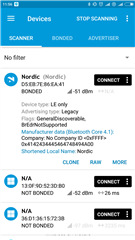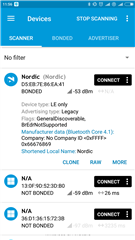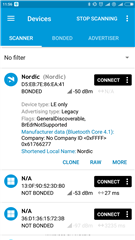Hi,
I have been trying to advertise packets with different manufacturer data and I am able to achieve that using the radio_notification_handler of the SDK. In my code, I have initialized the manufacturer data in the ble_advertising_init() function with around 10 bytes of data and if I don't change the data during advertising, I am able to receive them successfully. But, if I do change the data(the new data is also around 10 bytes) during advertising, I don't know why it gets stripped to 4 bytes of data. The data is changed using the ble_advdata_set() function call in the radio notification handler. I am working with SDK 14.2 and Softdevice 132. Can anyone tell me why this is happening? I know that we are only allowed 31 bytes of data, but the successful reception of 10 bytes initially, tells me that the size of the packet is not the issue here.
Thank You.





